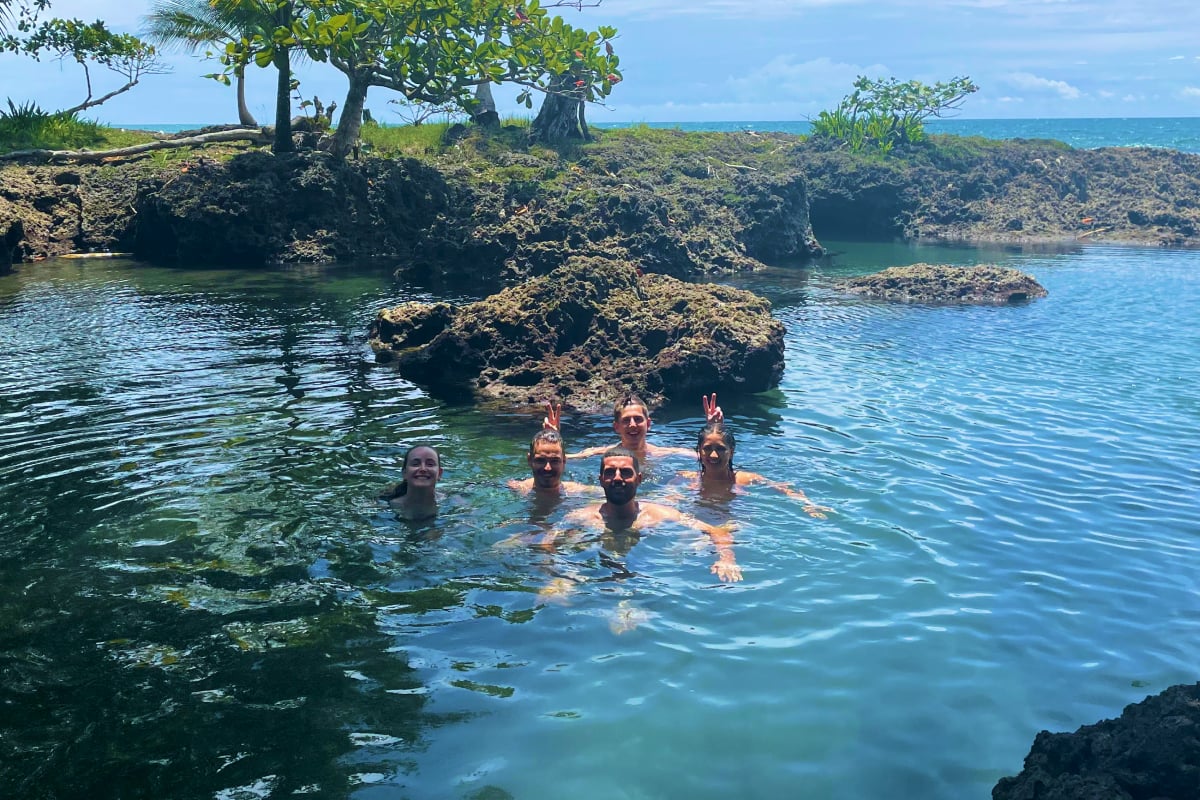
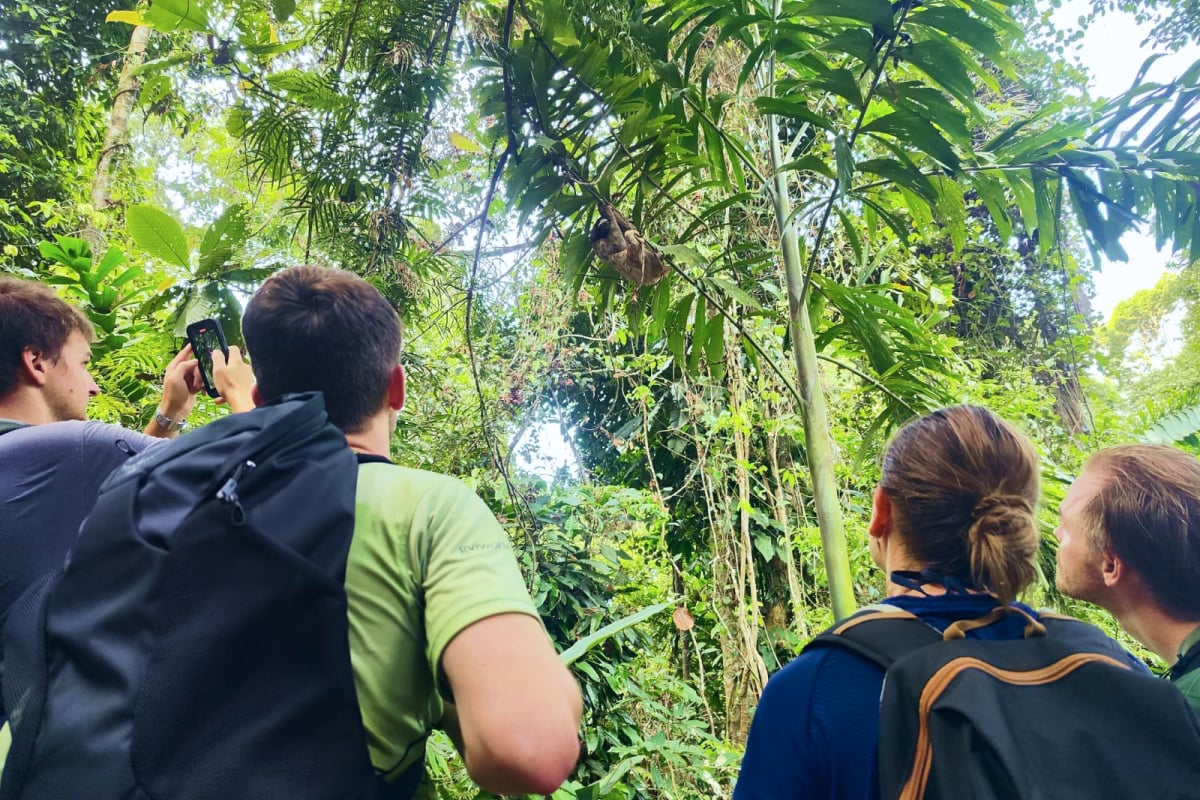
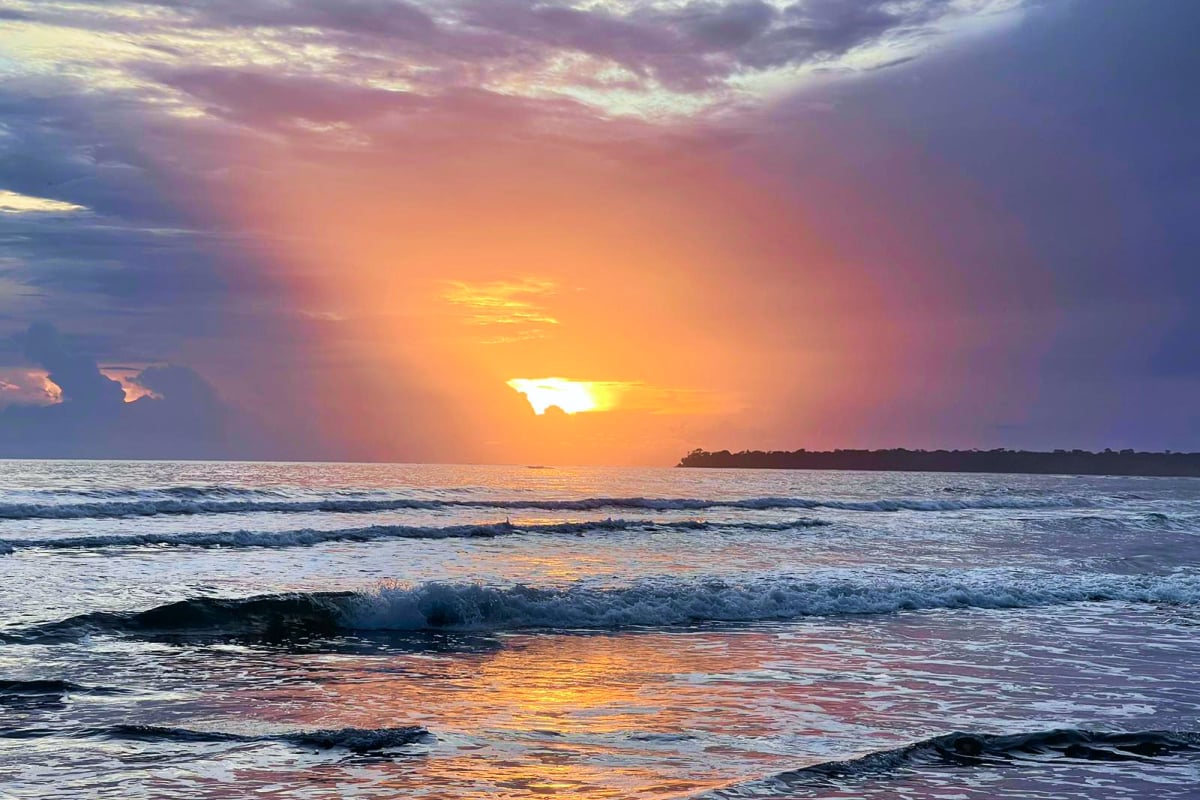
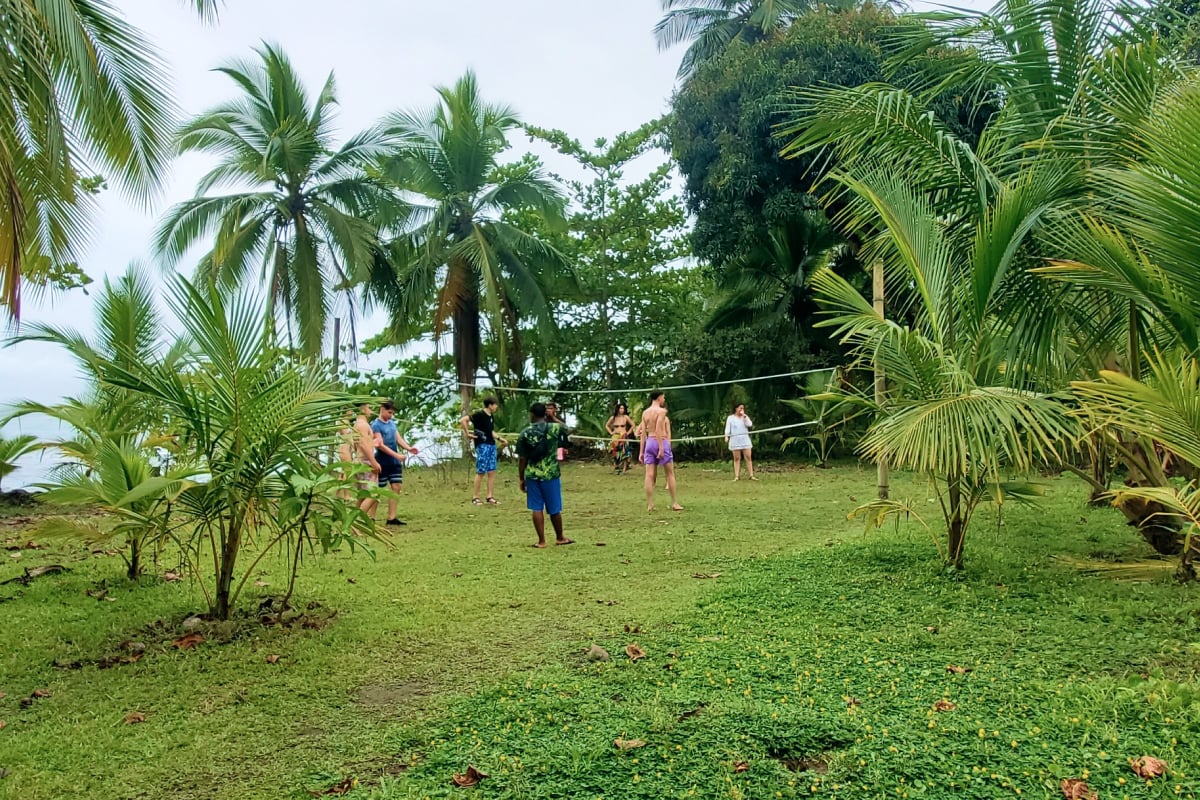
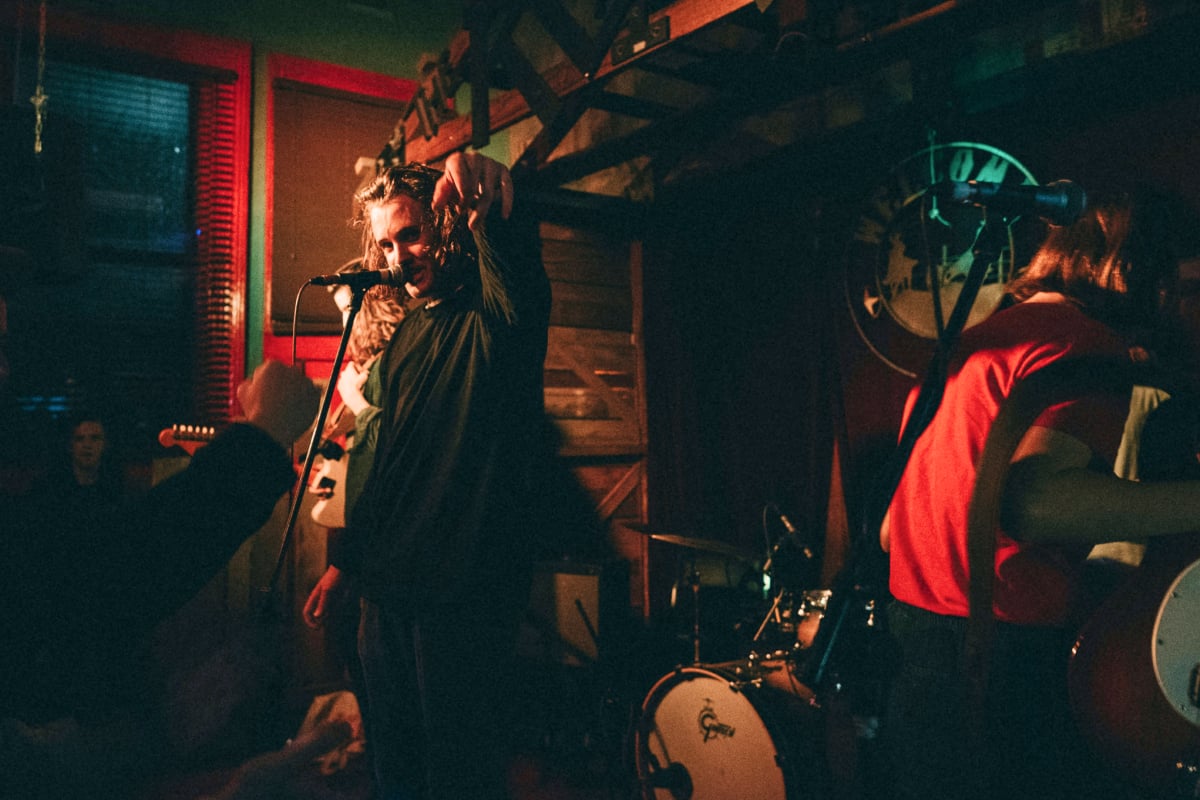
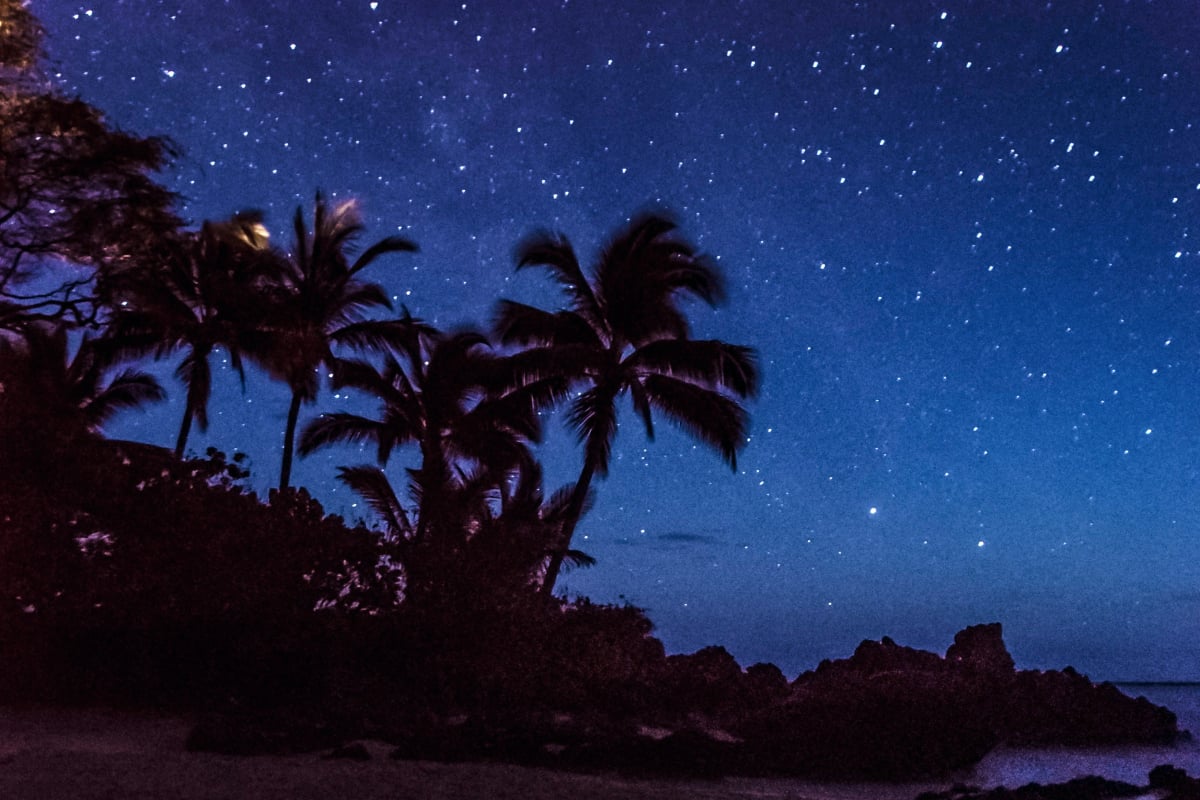
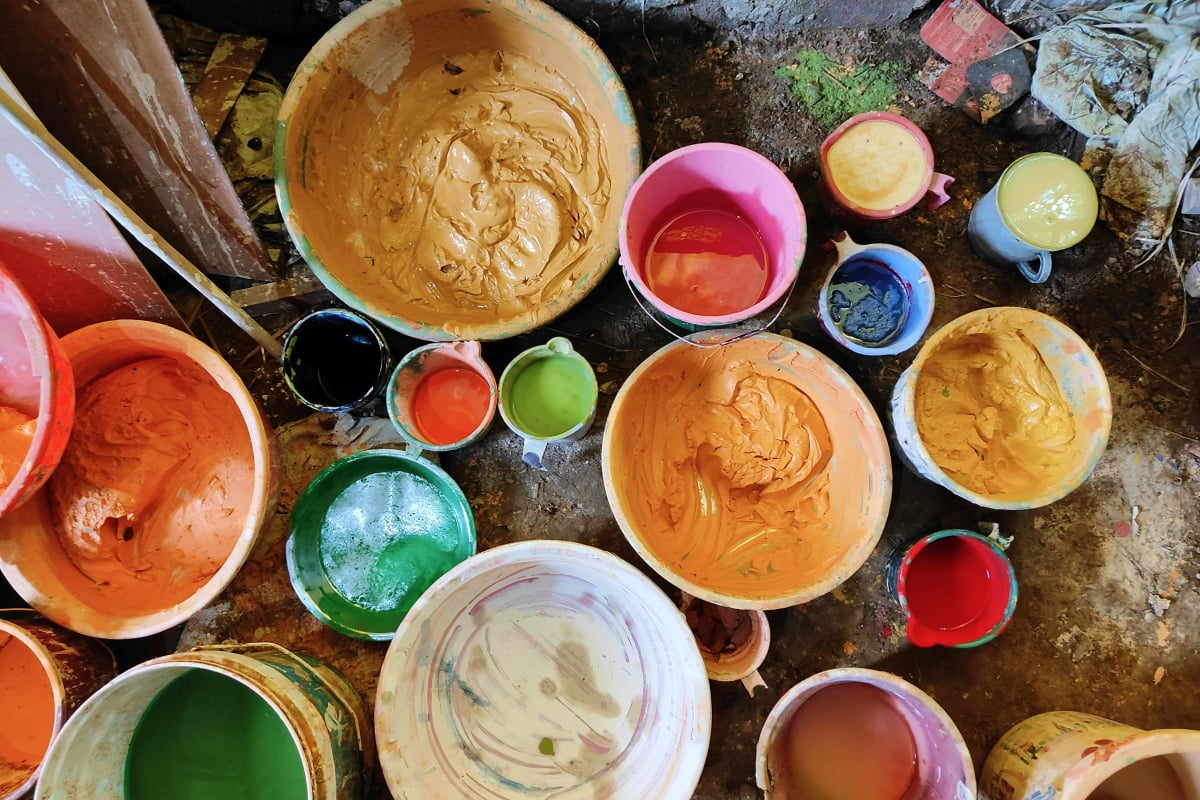
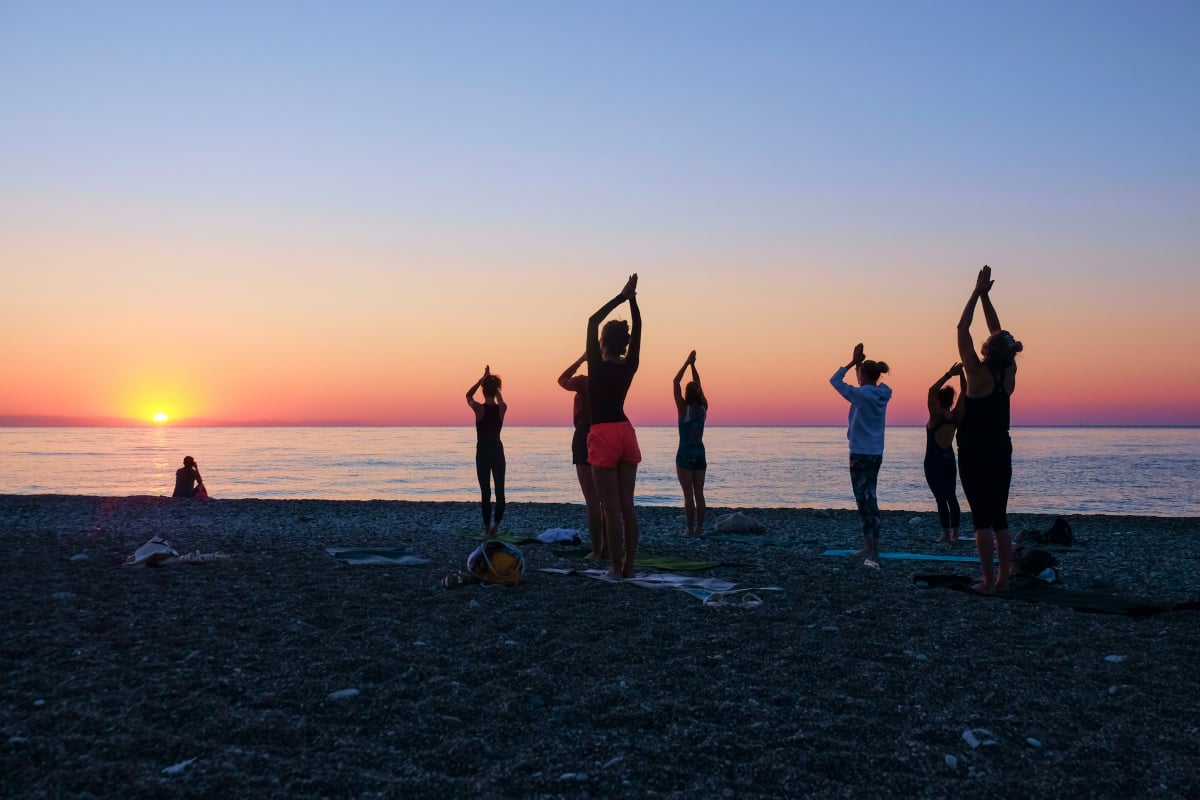






Protect giant leatherback, critically endangered hawksbill, and green sea turtles while contributing to ethical, research-driven conservation on Costa Rica’s stunning Caribbean coast. You’ll work alongside marine conservationists to document nesting data, monitor hatchlings, and support their safe journey to the ocean. Join this hands-on initiative and make a real impact in coastal conservation.

As the waves roll onto Cahuita’s golden shores, a giant leatherback sea turtle emerges under the cover of night, leaving tracks in the soft sand as she searches for a safe nesting spot. This is where your journey begins. On this immersive coastal conservation program, you’ll work alongside marine conservationists and local partners to monitor nesting sea turtles, protect hatchlings, and contribute to critical research on Costa Rica’s Caribbean coast.
Your work will directly support UN SDG #13, Climate Action, and UN SDG #14, Life Below Water, ensuring a long-term impact on marine biodiversity. Working side by side with Turtle Rescue Cahuita (TRC), you’ll conduct night patrols to record nesting activity, assist in nest relocations, and help release hatchlings of leatherback, hawkbill, and green sea turtles safely into the ocean. During the day, you’ll take part in turtle nursery maintenance, biodiversity surveys, and beach cleanups, reducing threats to nesting habitats.
As you explore the coastline and forests, you could spot scarlet macaws gliding through the canopy, toucans hopping between branches, and white-collared manakins performing their rapid-fire courtship displays in the dappled jungle light. The nearby jungle is also home to howler monkeys, sloths, coatis, and the elusive kinkajou, offering plenty of chances to witness Costa Rica’s extraordinary biodiversity.
In your free time, immerse yourself in the Afro-Caribbean rhythms of Cahuita, where reggae music drifts through the air and the scent of coconut-infused cuisine fills the streets. Explore Cahuita National Park’s rainforest trails, snorkel over coral reefs teeming with marine life, or paddle along the coastline by kayak.
Join us on this once-in-a-lifetime adventure and contribute to the protection of some of the planet’s most ancient and endangered species.








Some of the example typical activities you could participate in on this program.








Some of the partners we work with on base.











General | |
|---|---|
| Food | |
| Safe and basic accommodation (usually shared) | |
| Airport pick up (unless stated) | |
| All project equipment | |
| 24-hour in-country support from local staff | |
| 24-hour emergency desk | |
| GVI Experiences |
Activities | |
|---|---|
| Sustainable project work | |
| Data collection and research |
Pre-program training | |
|---|---|
| Pre-departure webinar | |
| Pre-departure training (online) | |
| University of Richmond endorsed specialisation course |
Welcome training | |
|---|---|
| GVI welcome presentation | |
| Health & safety | |
| Local culture & environment | |
| UN SDGs | |
| Impact & ethics | |
| Child protection |
Certificates | |
|---|---|
| Program certificate | |
| University certificate – specialisation (University of Richmond) |
Not included |
|---|
| Flights |
| International and domestic airport taxes |
| Medical and travel insurance |
| Visa costs |
| Police or background check |
| Personal items and toiletries |
| Additional drinks and gratuities |
Nestled among lush rainforests and endless beaches in the Limón province of Costa Rica, Cahuita (pronounced kah-WEE-tah) is renowned for its pristine coastline, rich biodiversity and vibrant Afro-Caribbean culture. The forests that surround you are filled with migratory birds, jungle birds and a wide variety of mammals, reptiles and amphibians. You might even encounter more elusive animals like sloths and tamanduas, or come across signs of the extremely elusive jungle cats that may roam the area..
Our satellite turtle research station is situated in the small, idyllic village of Hone Creek, just a few kilometres outside of town, near the secluded project site on Playa Grande beach. It’s on the white sands of Playa Grande that most of your work will take place, as you embark on early morning or night patrols, searching for turtle eggs, looking for tracks and digging out nests, amongst other important conservation activities.






The program requires a good level of fitness. Most days are spent on the beach completing physical project work activities. Be mindful of the humidity and heat.
We want you to make the most of the chance to live in – and contribute towards – the most diverse and unique wildernesses and communities on earth. Introducing GVI Experiences – immersive adventure, cultural and wellness activities exclusive to GVI that have been specially designed in collaboration with our local partners to support and stimulate sustainable economic development.
Enhance your impact. Expand your adventure. Explore your world.








By joining a GVI program, you not only contribute to preserving unique ecosystems but also get the chance to explore the surrounding area or venture further to see what else the region has to offer on weekends.
Our field staff are a great source of advice on local travel options. Many participants choose to travel before or after their experience, solidifying friendships made on the program.
Engaging with a new context teaches global awareness, adaptability and critical thinking – skills highly valued in today’s world. Cultural immersion is encouraged, and there are many activities to enjoy during your free time or before and after your program. Please note, these suggestions aren’t included in the program fee and are at your own expense.









Frisbee, volleyball, yoga, and pretty much any exercise can be done on the beach.


Surfing, windsurfing and kayaking are just some of the many water sports you can enjoy on either of Costa Rica’s two coasts.

Learn more about how the raw products of these everyday treats are produced at one of Costa Rica’s many coffee and chocolate farms.



If you’d like to find out what the experience of joining a GVI project is really like, simply contact us and we’ll put you in touch with one of our many Alumni.
We’ll try to match you to an Alum based on your location, nationality, age, stage of academic career, gender, and program interests. This allows you to gain insights into the experience that is most relevant to you.
Depending on your location you might be able to speak to an Alum over the phone or online, or meet up with them face-to-face at a coffee shop nearby. We also run a series of small events around the world where you can speak to GVI Alumni, Ambassadors and staff members.
‘If only every student could do this. It changes your life in all the right ways,’ says Chris Heritage, parent of Luke Heritage, one of our teen volunteers who has participated on two GVI programs, one in Costa Rica and another in South Africa.
We are a parent-run organisation that is incredibly serious about health and safety, and increasing the impact, as well as the long-term career benefits of our programs. Our programs help young people develop the skills to select a career path that is personally fulfilling, and live a life aligned to the well-being of our planet and the global community.
GVI is a proud member of the Gap Year Association.
Ken and Linda Jeffrey, whose son Sam volunteered with GVI in Thailand, talk about how the experience affected Sam. He also went on to volunteer with GVI again in South Africa. ‘I know it sounds like a cliche but in a sense, he did go away as a boy and he came back as a young man. Both of us could recommend GVI without any hesitation to any other parent thinking about exploring an opportunity for their children to explore the world and to see different parts of it.’
Download the Parent Pack and learn more about:
Our staff: All our projects are run by staff, selected, vetted, trained, and managed by our central office.
Health and safety: Our safety practices include a child and vulnerable adult protection policy and high participant ratios.
Staying in touch: See what’s happening on base, by following a hub’s dedicated Facebook page.
Free parent consultations: We would love to talk to you about exciting opportunities available for your child.



When it comes to support, we ensure that each participant is provided with unparalleled, 360 degree support, from your initial contact with the GVI Family, all the way through your program, and even after, as you become part of the GVI Alumni Team.
As part of this promise, we will ensure, whenever possible, that one of our dedicated staff will be available to meet you at the airport. In most locations, we also set up a Whatsapp group to help with managing airport arrivals.
We will arrange with you prior to your departure that, should you arrive in the agreed upon pick up window, a member of our staff will be there to welcome you, easily identifiable in a GVI t-shirt or holding a GVI sign and wearing a friendly smile.
This means there will be someone there to greet you as you land, and from there you will be transported to your GVI base to start your adventure and meet the rest of your team.


Please note that if you use this service delivered by Student Universe and / or if you buy your ticket through this portal you are agreeing to the Student Universe Privacy Policy and Terms and Conditions. Your agreement regarding flights will be between you and Student Universe or as per their terms and conditions.
As GVI is providing this portal as a service we are not responsible for the accuracy of this site.
We are also not responsible for any loss, damage (including loss of profits or consequential damages), injury, illness, harm or death in relation to your flight and travel arrangements.
All of our programs have short-, mid- and long-term objectives that align with the United Nations Sustainable Development Goals (UN SDGs). This enables us to report on our collaborative impact across the world in a streamlined manner, measuring which UN SDGs we are making a substantial contribution to. Furthermore, this will help our local partners and communities measure and visualise their contribution to the UN SDGs.
Prior to your arrival on base, you will be educated about the UN SDGs. Then once you arrive on base, you’ll learn about the specific goals we have in this particular location, our various objectives, and also clarification of how your personal, shorter-term involvement contributes to these.
Our aim is to educate you on local and global issues, so that you continue to be an active global citizen after your program, helping to fulfil our mission of building a global network of people united by their passion to make a difference.

Sea Turtle Research
We assist Turtle Rescue Cahuita (TRC) with sea turtle research and protection by patrolling the beach and assisting in hatchery opportunities – using internationally recognised protocols – during turtle nesting and hatching season. The prime time for turtle sightings, including green, hawksbill and leatherbacks, is April/May. For observing adult turtles, March to May is ideal, while May to August offers the best chance to see eggs and hatchlings.
To participate in the turtle project, you’ll need a good pair of rubber boots, thick socks and dark-coloured, long-sleeved, lightweight clothing.
From March to August a team walks the beach each night looking for nesting sea turtles. Depending on the time of year, you might not see a single turtle, or you might see multiple turtles in one night. When a turtle is encountered, different kinds of research activities might be carried out, depending on what stage of the nesting process she is in – emerging from the sea, selecting a nest site, digging a body pit, digging her egg chamber to lay her eggs, covering her egg chamber, disguising her nest, or returning to sea. This might include checking for distinctive markings to see if she’s been to the beach before and making a note for future researchers if she returns, tagging her flippers, measuring her carapace, counting her eggs, marking her nest, or checking for abnormalities in the mother turtle or eggs. You might also determine whether any eggs have hatched, been eroded by the sea, been attacked by predators (like raccoons, white-nosed coatis or ghost crabs), or been poached by humans. This information is used to investigate whether any areas of the beach are more susceptible to nest loss.
Hatched nests are excavated to determine hatchling success and survival rates, the reason for losses in egg development, and the actual status of the nests, including whether or not they were partially or fully poached.
Biodiversity surveys
Depending on the needs of our partners, you may have the opportunity to assist with biodiversity monitoring and citizen science, where you’ll collect data on local wildlife both along the coast and within the area surrounding the hub, contributing to ongoing conservation efforts.
GVI Cahuita’s long-term Objectives:
1. To protect and safely release sea turtles back into the ocean, contributing to their conservation.
2. To lead community conservation initiatives and beach cleanups, raising awareness and encouraging local involvement.
3. Increase understanding of the region’s diverse wildlife and its role in the ecosystem.
4. Provide valuable data to conservation partners to support the sustainable management and protection of Costa Rica’s natural resources.
5. Build local capacity and foster long-term conservation efforts to protect biodiversity and promote sustainable community development.
6. Enhance public awareness and appreciation of Costa Rica’s coastal environments and the importance of protecting endangered species.
Below is a list of core ethics and best practices we believe are essential to the operation of high quality, ethical volunteer and sustainable development programs. We believe that all responsible volunteer and sustainable development operations should focus upon these principles. If you are considering volunteering, these are some of the key considerations you should question, to ensure that your time and money contributes towards positive change.
We want to constantly develop our own understanding of ethical best practice. In so doing, we aim to provide an exemplary industry standard for other education institutions, international development organisations, and social enterprises. Our Badge of Ethics stands for the drive to always do good, better. Find out more, click on the Badge below.
We aim to design all our projects in collaboration with local organizations and communities and ensure that they are locally driven.
We aim to clearly define short-, mid-, and long-term objectives with sustainable outcomes for all our projects.
We aim to track, record, and publish the impact of each of our projects.
We aim to build in-country capacity by assisting local organizations in becoming self-sustaining.
For each local organization we work with, we aim to have a plan in place for withdrawing support responsibly.
We aim to ensure that every participant is assigned a clear role and that they are fully trained and supported to carry out their work by specialized staff.
In all our actions we aim to respect the skills and efforts of all and seek to protect the rights, culture and dignity of everyone who engages with GVI.
We work to ensure that credit for the results of any project, along with any data collected, research conducted, or Intellectual Property developed, remains the property of local organizations.
We do not condone and aim to withdraw support of orphanages and residential care centers.
We will live by our Child Protection and Vulnerable Adult policies.
As an organization, GVI is committed to striving toward best practice, and to educating both our potential participants, our partners, and the world at large about them. Both the volunteering and sustainable development sectors are increasingly, and rightly, under scrutiny. Many recent local and global articles highlight poor practices and questionable ethics. GVI is widely recognized for striving to apply global best practice in the volunteering, education and sustainable development sectors throughout our operations by reputable organizations such as ChildSafe.
However, global best practice is always evolving and we dedicate both time and resources to engage with internationally respected experts and learn from the latest research to ensure our programs both fulfil their potential to create maximum positive impact, and minimise their potential to create unintentional negative impact. Along with and as part of the sustainable development and volunteering community, we are constantly learning and applying this learning to practice. We do not always get everything right, but we seek feedback from our community members, partners, participants and our staff, and react accordingly. We know are already doing a great job, and feedback we have received confirms this, but we aim to do even better and are continuously refining our operations to improve upon our already excellent reputation.
We don’t support or allow participants to work in institutional residential care facilities, also known as orphanages. We partner with ReThink Orphanages and Freedom United.
Our Child and Vulnerable Adult Protection Policy requires all our staff and participants to complete a criminal background check and to learn why you shouldn’t reveal a child’s identifying factors in photographs. We support the ChildSafe Movement.
We don’t offer any programs where our participants engage in medical treatment. This is because our participants aren’t typically qualified to do this work and would therefore not be able to do this work in their home country. Our participants only assist with public health programs.
We don’t offer any programs where our participants work directly with people with disabilities. This is because our participants aren’t typically qualified to do this work and would therefore not be able to do this work in their home country.
Each one of our initiatives is aligned to objectives set by a local organisation or professional. Our staff and participants work to support these local actors in achieving their specific goals.
Our participants don’t replace the staff employed by local organisations. Rather, they support currently employed staff with achieving their objectives. Our goal is always to increase local capacity to address local problems.
Participants require training and support to ensure that they carry out tasks correctly. Our staff provide this training and support so that local staff can focus on what is truly important to their organisation at the time.
We don’t support the use of wild animals for entertainment purposes. This includes riding animals, having them perform tricks, feeding or bathing them or getting close to them to take photos
We don’t encourage, support or allow the rearing of “orphaned” wild baby animals kept at a “sanctuary”. The conservation value of these types of programs is negligent and would only ethically be used in extremely rare cases
When wild animals are restricted for conservation purposes we follow the guidelines of Fair Trade in Tourism South Africa (FTTSA), approved by the Global Sustainable Tourism Council.
We ensure that the Five Freedoms of Animal Welfare are followed. These include the freedom to express normal behaviour and freedom from distress, discomfort, hunger, thirst, fear, pain, injury or disease.
We ensure that conservation efforts are also always locally led, that community needs are front-and centre of any conservation effort and that our participants, projects and partners work to increase local community engagement in local conservation efforts.
We don’t offer any veterinary programs or animal rescue and rehabilitation programs. We don’t allow participants to do any work they would not be able to do in their home country.
A GVI program is an investment in your career. No matter which you choose, you will be working toward improving your employability by mastering new social skills, gaining further technical expertise and earning qualifications in many cases. Most of our staff are, in fact, GVI Alumni, and we have helped many of our Alumni discover, move toward, and earn their own personal dream jobs. Each program includes introductory workshops, ongoing presentations, as well as on-the-ground professional support provided by our very own trained staff members. In addition, our training programs are critical for helping us to ensure the long-term impact of our sustainable development projects around the world.
Learn about the importance of child and vulnerable adult protection best practices and how to apply them while on project.
Introduction to the history and evolution of sustainable development, the United Nations Sustainable Development Goals (UN SDGs) and how these related to your project work.
Learn about our country locations and further opportunities available to you during or after your program.

If you have a passion for wildlife conservation then this course will provide you with the foundational skills and understanding needed to achieve your conservation-related goals. You’ll learn about the various methods of wildlife monitoring, as well as exploring the delicate balance involved in terrestrial ecosystem management. After successfully completing the course, which you have the option of doing prior to your in-country program, you’ll receive a certificate from the University of Richmond.
This online course, valued at £295, is included in all volunteering programs. Full course details can be found here.
We won’t sugarcoat it — traveling abroad is usually a complex process that carries an element of risk. But this is exactly why we’re passionate about providing extensive support throughout the process as well as the highest safety standards during the in-country phase. We believe that volunteering abroad should not only be impactful, but an enjoyable experience that carries as little risk as possible. This is exactly how we’ve been able to maintain our reputation as the most highly respected volunteering organisations in the sector over the past two decades.







Make the most of our unique programs with these exclusively curated local adventure and wellness experiences.




















